Achieving visibility and ranking on search engine result pages (SERPs) has become critical for businesses looking to grow their online presence. One of the primary drivers behind these rankings is the effective use of SERP keywords.
Explore with me the ABCs of SERP Keywords. I’ll delve deeper into understanding what they are, their importance in SEO, different types of SERP features, and strategies to rank higher on search engines like Google.
What is a Search Engine Results Pages Keyword?
A SERP keyword refers to any word or phrase users input into a search query when seeking information through search engines. These keywords bridge the gap between your website’s content and potential visitors who may be interested in your offerings.
Search Engines like Google evaluate web pages against an extensive range of ranking factors before determining which page should appear at the top positions. One crucial factor lies within targeting relevant keywords that align with user intent. By incorporating these “SERP Keywords” effectively throughout your website’s content, you accomplish two goals:
- Ensure a connection with potential visitors’ needs.
- Demonstrate to search engines that your content is valuable and actionable.
As a result, your site will earn higher rankings for the searched term —simple, right?
Importance of SERP Keywords for SEO
SERP keywords are vital in achieving better SEO performance by improving visibility and relevance in search results pages. The benefits of utilizing strategic SERP keywords include higher organic traffic, better conversion rates, and the advantage of outperforming competitors.
Improved Visibility and Relevance
When it comes to search engine optimization (SEO), understanding and using strategic SERP keywords is crucial. These keywords significantly impact a website’s visibility and relevance in search engine results pages (SERPs). By incorporating relevant, high-quality keywords into your content, you can enhance your site’s ability to attract target audiences searching for the information or products your site provides.
Higher Organic Traffic
The main goal of SEO efforts is to drive organic traffic from search engines toward your website. Through SERP analysis and targeted SERP keywords, digital marketers strengthen their websites’ positioning within search results. This increased online presence helps generate awareness among prospective customers seeking solutions your brand delivers, leading to higher click-through rates and conversions.
Better Conversion Rates
Incorporate well-researched SERP keywords into your website’s content to improve user experience. Consequently, when users discover relevant content on your site matching their queries, they are more likely to stay longer on the page. They’re also more likely to explore further content options like signing up for newsletters or taking other desirable actions – all contributing positively to conversion rates.
Outrank Competitors
Finally, optimizing webpages with effective SERP keyword strategies maximizes visibility and allows brands to outrank competitors in search results. A well-orchestrated keyword plan ultimately leads you closer to favorable customer prospects who become loyal clients over time —boosting business development exponentially.
Types of SERP Features
Search Engine Results Pages (SERPs) have evolved over time and now feature different types of results, catering to the needs of users looking for a quick answer or engaging content. Understanding these SERP features is essential as they help optimize your site for better visibility and click-through rates.
As we’re coffee and blueberries lovers, we are using examples connected with this field.
Organic Search Results
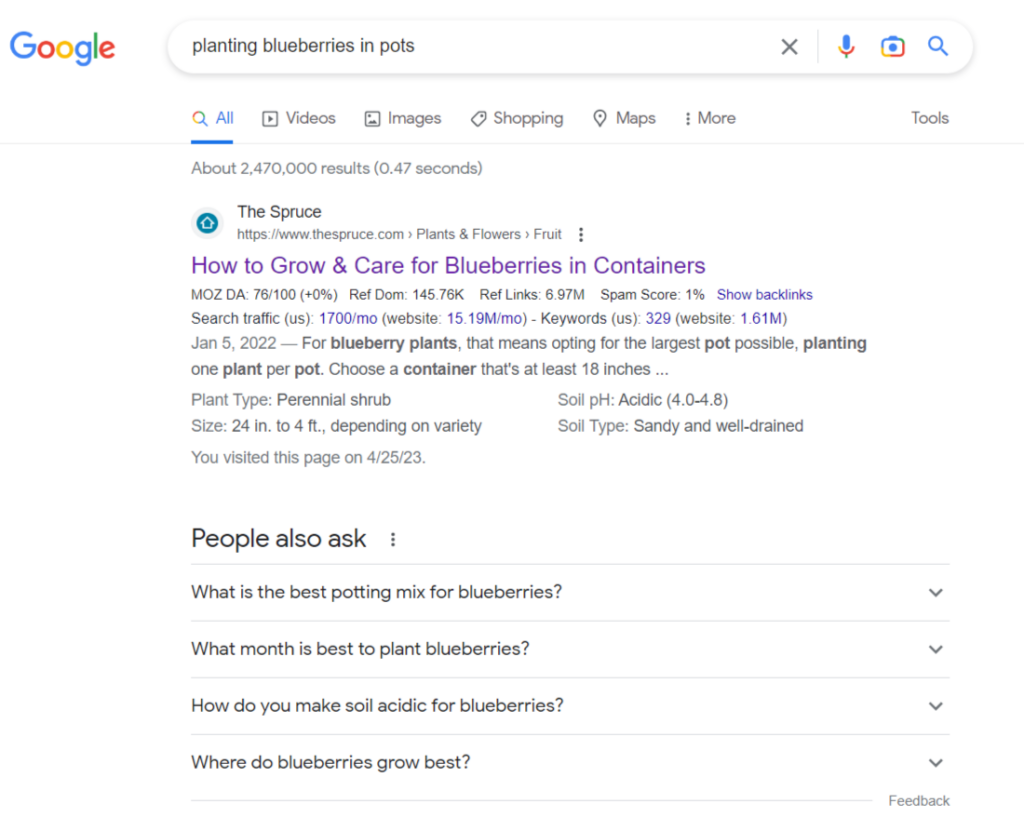
Organic search results refer to the web pages that appear on SERPs due to their relevance to the user’s query based on Google’s algorithm. They are not influenced by paid advertising and provide a level playing field for content creators, primarily decided by relevant keywords, quality backlinks, and efficient on-page SEO techniques. As they offer free exposure, focusing on organic search ranking is critical for online success and building trust with users.
Paid Search Results
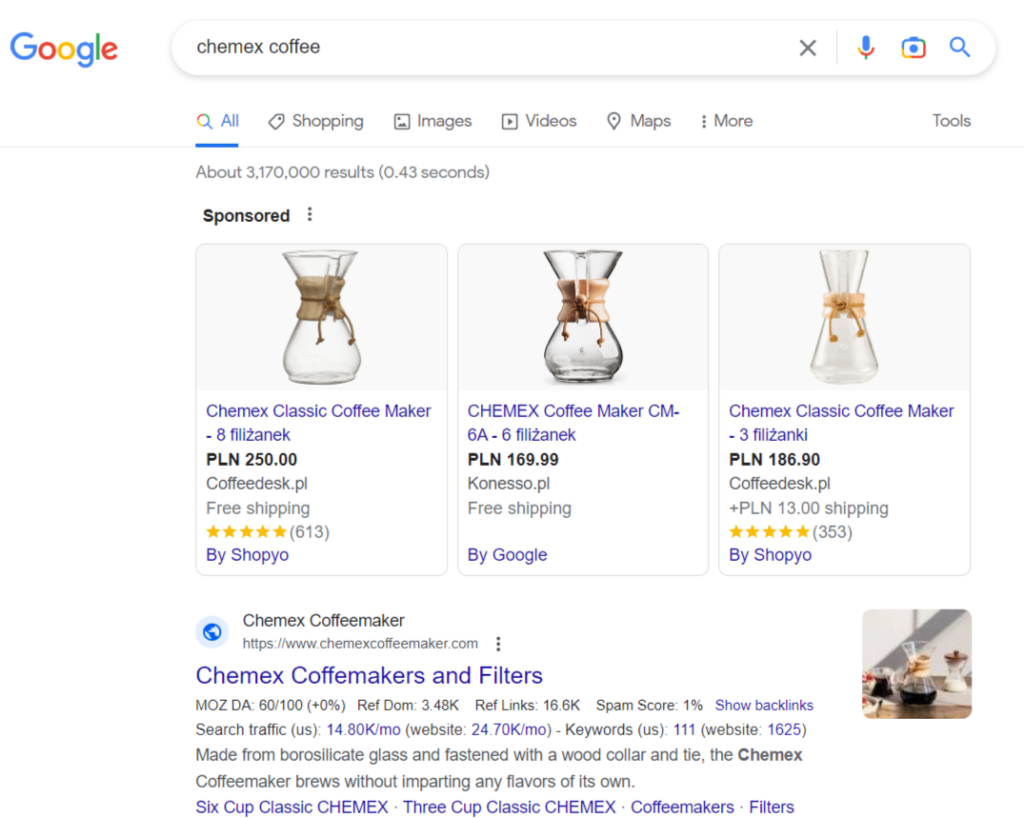
Paid search results are listings where website owners pay for ad placements at the top or side of the SERPs through platforms like Google Ads. These ads are displayed above organic search results, making them more visible to users. Advertisers bid on specific keywords relevant to their business or products and get charged whenever a user clicks on their ad—a service known as Pay-Per-Click (PPC).
Featured Snippets
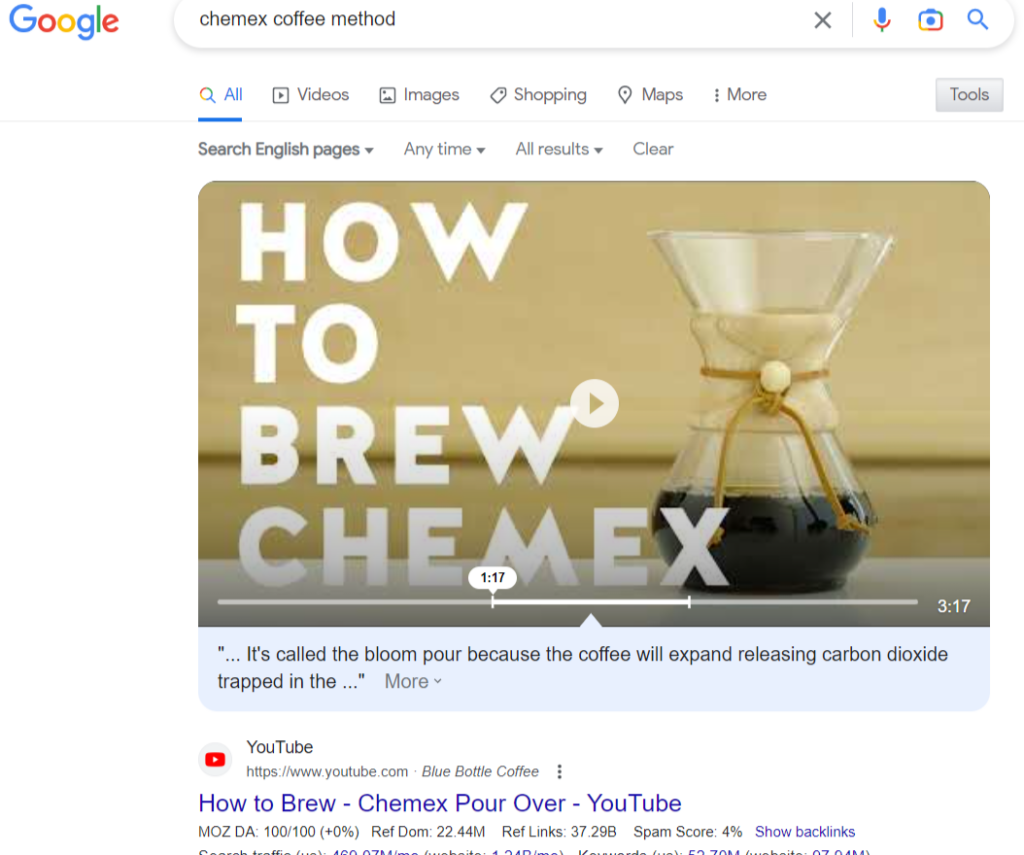
Featured snippets appear at the top of the Google search results and contain a brief excerpt from a webpage that directly answers the user’s query. They enhance visibility by taking up more screen real estate than conventional organic listings while providing descriptive information about the content featured inside. To optimize content for featured snippets, ensure concise answers targeting common questions related to your keyword.
Direct Answer Box
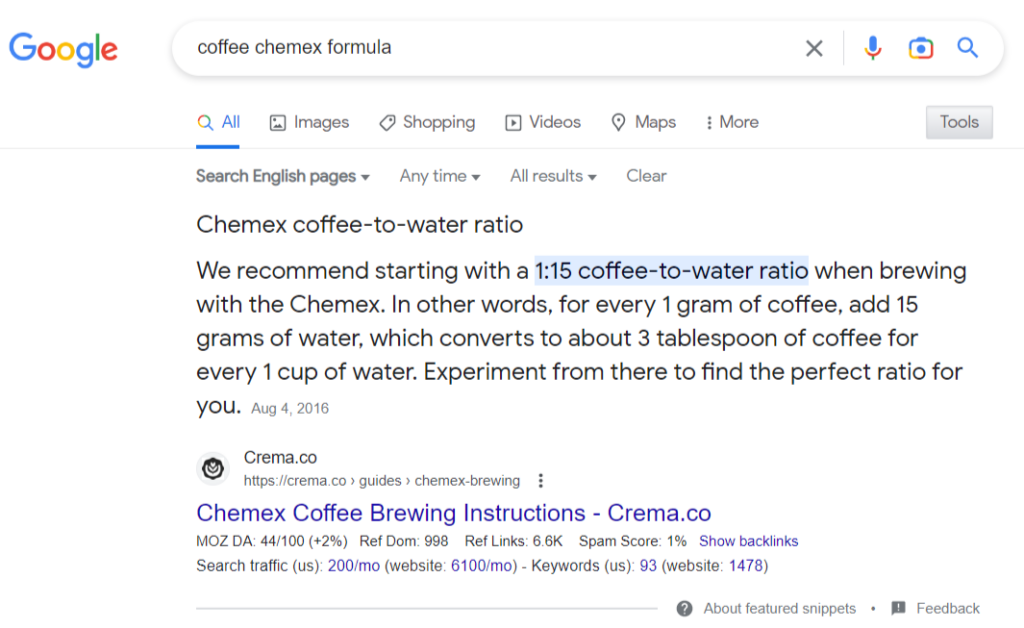
A direct answer box is another unique SERP feature that provides an instant answer without requiring users to visit websites. These boxes display when someone searches using question-type phrases or queries seeking clear-cut facts, often calculators, definitions, or brief explanations suiting this purpose. While it may dissuade users from clicking on your website, having content displayed in a direct answer box establishes you as an authority within the field.
Knowledge Graph and Knowledge Panel
The search engine uses the Google Knowledge Graph database to generate and augment more diverse search results. Meanwhile, the knowledge panel visually represents this data on SERPs containing critical facts related to a query, such as businesses’ operating hours, contact information, or Wikipedia summaries. Optimizing your site for structured data markup enhances your chances of appearing in these panels.
Local Packs
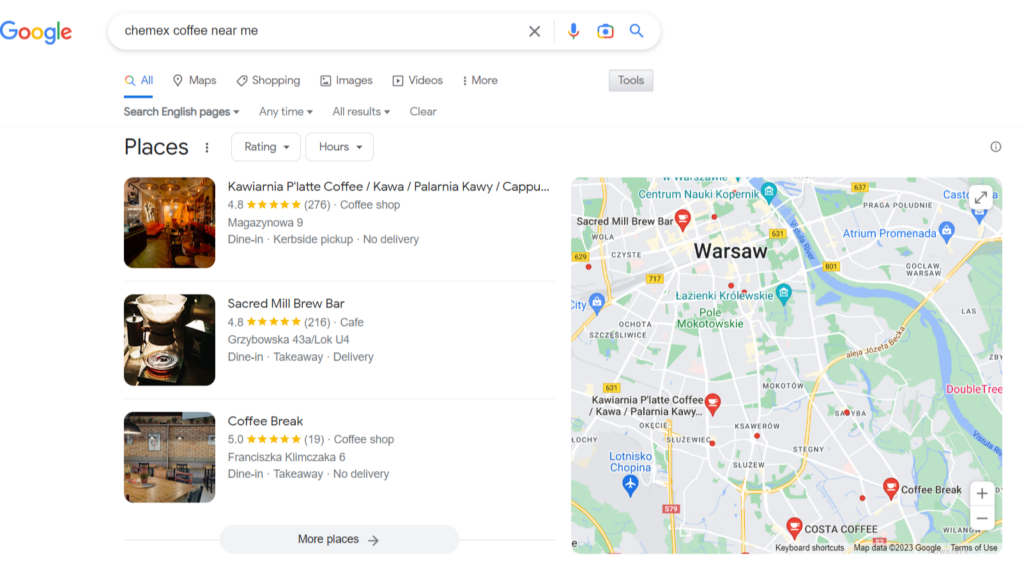
Local Packs are essential SERP features for local businesses as they display prominently at the top of SERPs when searching queries with localized intent like “restaurants near me” or “dentists in [City].” They provide users with relevant information such as store name, address, phone number, reviews, and sometimes visuals. Ensure proper business listings management with accurate NAP (Name, Address & Phone Number) details to rank higher in local searches.
Google Image Results
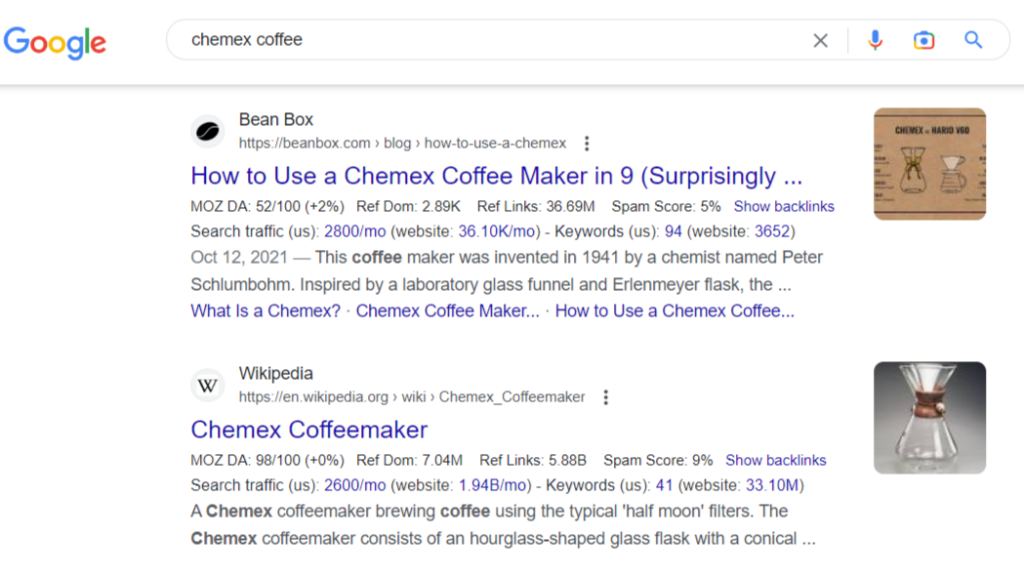
Google image results appear on SERPs when users initiate image-specific searches or look up search queries that can benefit from accompanying visuals such as photography tips or fashion styles. To optimize images for visibility, apply descriptive file names and suitable alt texts. Make sure to compress images to reduce loading time without compromising quality.
Video Results
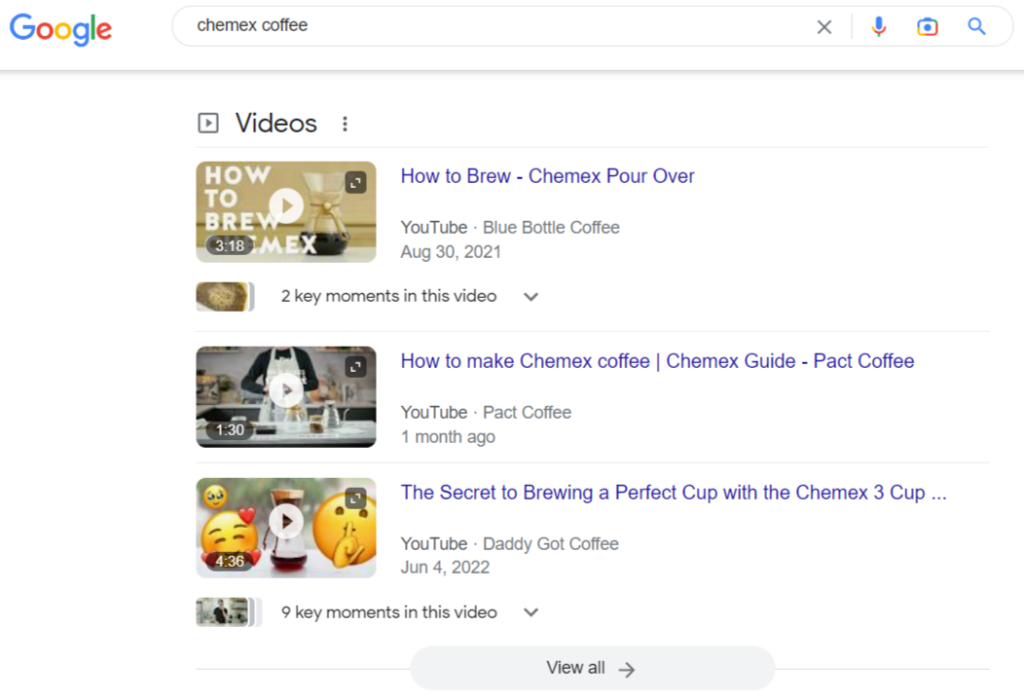
Videos can also be listed on SERPs alongside other content types due to their entertaining and educational potential. Platforms like YouTube heavily influence video results; optimizing titles, descriptions, and tags with keyword-rich content will contribute towards better ranking both in video-host
How to Discover SERP Features for Your Site?
To fully utilize the power of search engine results pages (SERPs), you must understand the various SERP features that your site can potentially rank in. Discovering these features will help you tailor your content and SEO strategies to maximize visibility and traffic.
This section provides a step-by-step process to find the SERP features applicable to your website.
Identify Target Keywords
Begin by identifying target keywords relevant to your niche or industry. Use tools such as Google Keyword Planner, SEMRush, or Ahrefs. These SERP keyword tools will provide data like monthly search volumes and competition levels associated with each keyword.
Perform Competitive Analysis
After narrowing down the list of target keywords, perform a competitive analysis for each one. Observe which SERP features appear in the search results for those top-ranking websites. Knowing what is in your competitor’s results can give you insight into their success factors, allowing you to adapt and implement similar strategies.
Use SERP Analysis Tools
Leverage specialized SERP analysis tools such as SEOwind, MozBar, or Ahrefs to conduct an in-depth study of individual SERPs. These apps enable users to analyze all aspects of a specific result page comprehensively. Some key elements they assess include keyword SERP check functionality, indexed URLs, rich snippet prevalence, backlink profile quality, and social media integration.
Monitor Changes Over Time
The landscape of search engines is ever-evolving. Monitoring changes over time is crucial for staying ahead of competitors regarding SERP features. Conduct regular audits.
Continuously keep track of fluctuations in organic ranking factors and algorithm updates by reviewing Search Engine Journal articles and subscribing to newsletters from industry leaders like Moz or Neil Patel.
Discovering relevant SERP features for your website entails thorough research backed up by the proper tools. Identify target keywords, analyze competition, use specialized programs, and consistently monitor changes to match your site’s most advantageous SERP features. This proactive approach will foster better SEO results and increase organic traffic driven by search engines.
What is the Strategy to Rank a Particular Keyword in Search Engines?
Every website owner or digital marketer strives to stay ahead of competitors by securing the highest rank for their targeted keywords in search engine results pages (SERPs). In this regard, it’s essential to have an effective and well-rounded strategy. To get your desired outcome, consider implementing the following steps:
Thorough Keyword Research
Before you can even begin to optimize your content, you must conduct thorough keyword research. This will help you identify phrases and terms related to your niche or industry that offer the highest volume and least competition. Analyze these keywords using tools such as the SERP keyword tool or SERP checker.
High-Quality Content Creation
Once you’ve identified relevant keywords, focus on creating unique content around them while keeping user intent in mind. Ensure your content is engaging and informative and effectively answers users’ questions. Strive for originality – avoid duplicating existing material online.
On-Page Optimization
On-page optimization involves optimizing parts of your web page directly within the HTML code, like meta tags, page titles, header tags, URL structure, alt text for images, and proper use of keywords throughout the content. Make sure each element aligns with your chosen keyword(s) without resorting to unnatural stuffing techniques.
Off-Page Optimization
Building high-quality backlinks remains a crucial part of attaining better rankings in SERPs. Reach out to reliable websites within your niche for guest post opportunities or engage in link-building strategies that adhere strictly to white-hat SEO practices.
Site Speed and Mobile Optimization
Considering Google’s emphasis on mobile-friendly sites when determining ranks, prioritize improving site speed and mobile optimization across all devices; this ensures faster load times for users accessing your site via smartphones or tablets will significantly boost overall user experience.
Monitor Performance & Adjust
Constant monitoring of performance data helps determine which strategies are working and which may require adjustments. You can use SERP analysis or charge some tools like the SERPs keyword tool for consistently tracking your site’s rankings and comprehensive reports to aid decision-making.
Tools to Track SERP Keywords
Successful digital marketing and search engine optimization (SEO) campaigns primarily revolve around monitoring the performance of targeted keywords on SERPs. Utilizing a reliable SERP keyword tool or a comprehensive SERP checker can help you track critical keyword metrics, identify new opportunities for growth or improvement, stay ahead of your competitors, and fine-tune your strategies. Let’s look at some of the widely-used tools that provide insights and assist in tracking relevant SERP keywords.
SEOwind
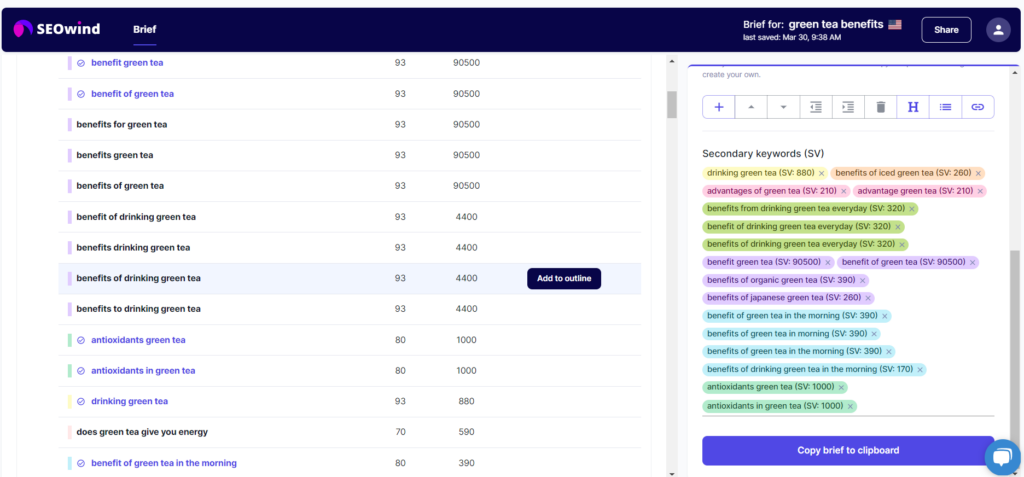
SEOwind is a SEO Content Intelligence tool designed to assist content creators and marketers in identifying the most relevant and high-performing keywords used in top-ranking content.
It provides information on search volume and keyword difficulty. What’s more, SEOwind uses AI to cluster the keywords. This way it is easier to include them in long-form
By analyzing the keywords used in successful content pieces, SEOwind enables users to craft their content briefs more effectively. This valuable insight allows users to create content optimized for search engines and resonating with their target audience.
AccuRanker
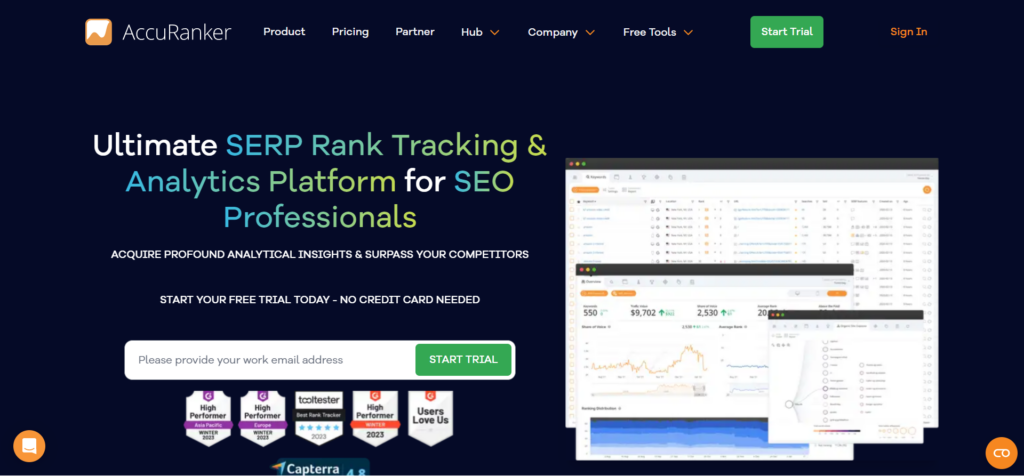
AccuRanker is a powerful SERP checker tool designed to monitor keyword rankings across search engines such as Google and Bing. Some noteworthy features offered by AccuRanker include:
- Competitor analysis
- Real-time updates
- Integration with Google Analytics
- Custom tagging capabilities
- Rank tracking filters based on the device used
With its fast and user-friendly interface, AccuRanker ensures efficient tracking of your core keywords and provides valuable data-driven insights.
SEMrush
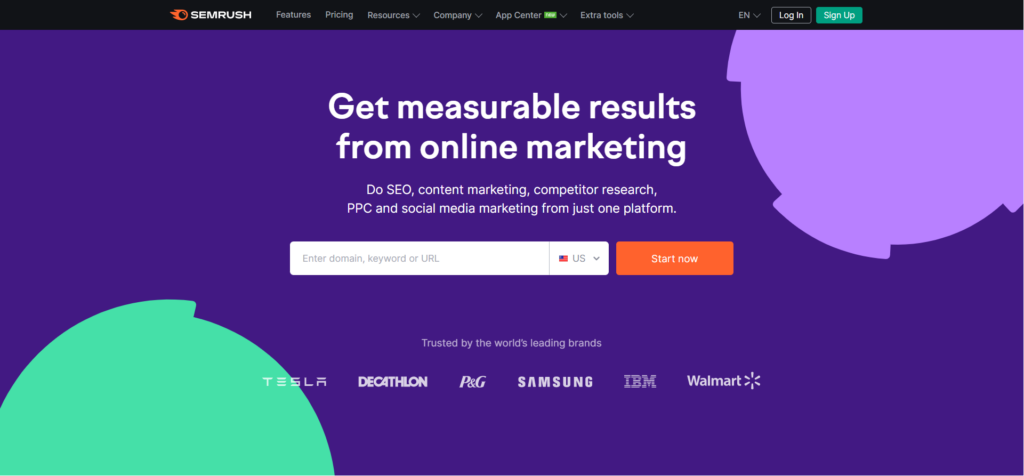
SEMrush is one of the most popular all-in-one SEO suites packed with numerous tools for marketers. It includes those focusing on SERP keywords. With extensive functionalities such as rank tracking, competitor research, audit reports, backlink analysis, content audits, and paid advertising analytics, SEMrush caters to businesses seeking comprehensive SEO solutions. Additionally, it offers API access, enabling users to integrate their proprietary data into custom applications seamlessly.
Ahrefs Keyword Explorer
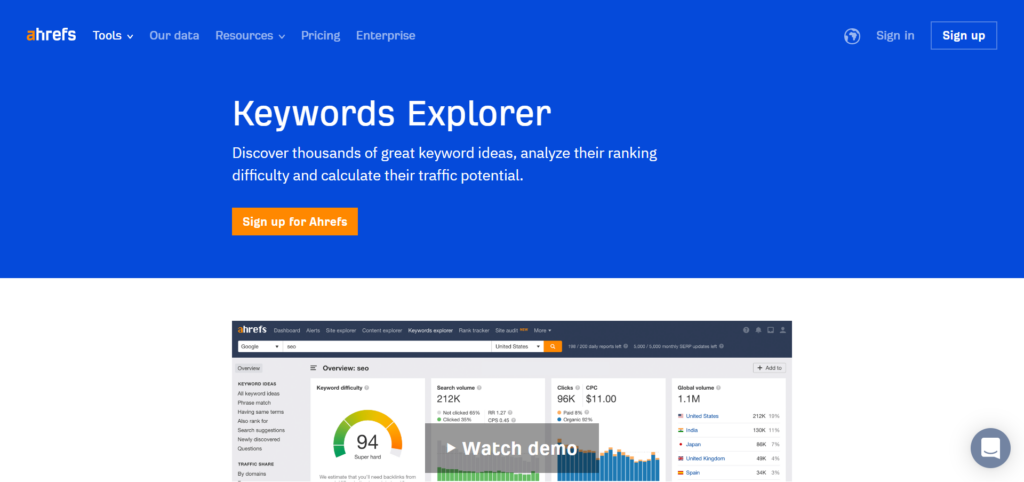
Ahrefs is yet another well-established name in digital marketing software solutions. Its feature-rich Keyword Explorer tool provides extensive information about targeted keywords, including:
- Keyword difficulty scores
- Click-through rates (CTR)
- Global search volume
- Search potential traffic estimates.
- Moreover, Ahrefs Keyword Explorer suggests synonymous or related terms making it easier for marketers to discover and optimize potential SERP keyword opportunities.
Moz Pro Rank Tracker
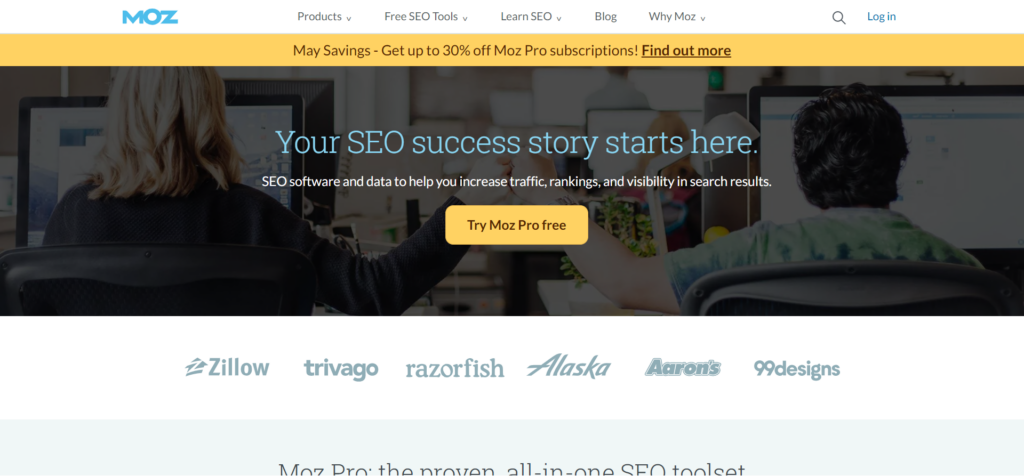
As a part of Moz’s suite of SEO tools, the Moz Pro Rank Tracker caters specifically to SERP keyword tracking needs. Utilizing their proprietary “Keyword Difficulty” metric, Moz provides domain authority data and insight into various keywords’ competitive landscape. In addition to desktop and mobile rank tracking, Moz tailors its reports with intuitive visualizations, simplifying complex data. It enables businesses to glean actionable insights on their targeted keywords’ performance.
Serpstat
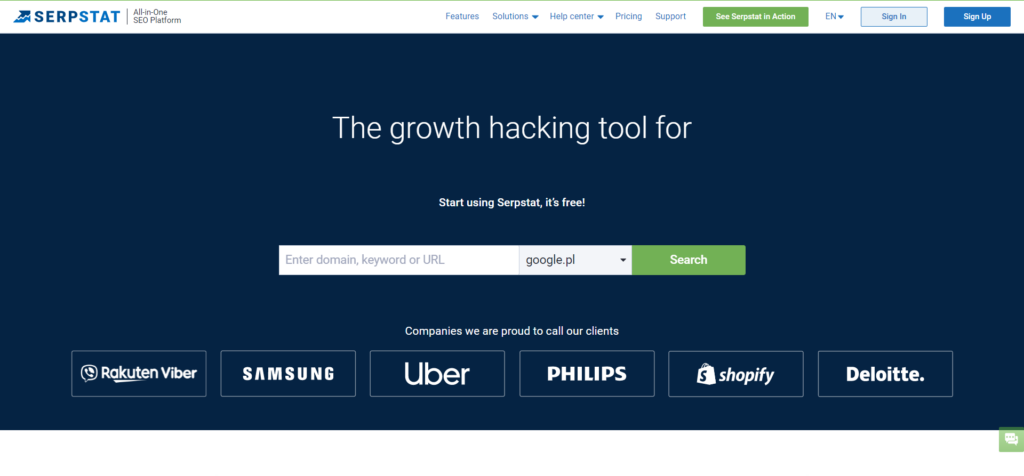
With a strong focus on analyzing SERPs, Serpstat is designed explicitly for marketers and businesses aiming to excel in search engine rankings. This versatile platform entails features like rank tracking, backlink analysis, competitor research, site audits, and in-depth URL analysis. Importantly, its dedicated Keyword Clustering feature helps group semantically similar phrases or terms together to maximize your content’s reach across diverse target audience segments.
Adequate tracking of SERP keywords is crucial for understanding your website’s performance and implementing better SEO strategies. While multiple tools are available in the market catering to different business requirements and budgets, identifying one that aligns best with your objectives is essential for efficient monitoring and optimization.
Using SERP Keywords for Local SEO
Local businesses can significantly benefit from implementing well-researched and targeted SERP keywords in their online marketing strategy. When done correctly, local SEO helps increase a business’s visibility within the community, driving more foot traffic and generating higher sales. This section will discuss how to utilize SERP keywords effectively for local SEO.
Identifying Relevant SERP Keywords for Local Businesses
The first step in optimizing your website for local search is identifying relevant keywords closely related to your products, services, or niche while incorporating geo-specific terms. For instance, if you own a bakery in San Francisco, target keywords such as “bakery in San Francisco,” “San Francisco cupcakes,” or “best cookies near me.”
To find these location-based keywords:
- Perform a SERP analysis.
- Use keyword research tools like Google Keyword Planner, Ahrefs, SEOwind or Semrush
- Analyze competitors’ sites to identify potential localized keyword opportunities.
Remember to balance highly competitive search terms and long-tail keywords with lower search volume but less competition.
On-Page Optimization Techniques
Optimizing your website’s content using the selected local-targeted SERP keywords helps improve its ranking on search engine results pages (SERPs) for those specific terms:
- Include localized SERP keywords in title tags, meta descriptions, headers (H1-H6), body text, image alt attributes, and URLs.
- Create location-specific landing pages targeting unique areas or neighborhoods.
- Provide your business name, address, and phone number (NAP) consistently across all web pages and online listings.
- Embed Google Maps to show your business location on contact pages.
Building Citations and Backlinks
Citations refer to instances where a business is mentioned—preferably along with its NAP details—on other websites such as social media profiles or review sites like Yelp or TripAdvisor. These citations are vital for enhancing local SEO.
- Create and optimize profiles on major online directories and local listing websites.
- Seek backlinks from high-quality.
Using SERP Keywords for Global SEO
In an increasingly globalized world, businesses need to adapt their SEO strategies accordingly to capture the full scope of their target markets. Utilizing SERP keywords effectively for global SEO ensures higher visibility and increased user engagement across different regions and languages. This section will discuss various techniques and strategies that enable you to achieve better rankings through optimized global SEO efforts.
Understand Your Target Audience
To successfully optimize your website for a worldwide audience, you must first understand the demographic you’re trying to reach. For each segment or region, consider factors such as:
- Relevant languages
- Cultural preferences
- Popular search engines in the territory
- Local competitors
Considering these aspects, you can develop targeted content featuring relevant SERP keywords that cater to different user groups.
Use hreflang Tags
Implementing hreflang tags is essential when working with multilingual websites. These HTML tags tell search engines which language version to show to users searching in that dialect. They prevent duplicate content issues and ensure proper translations are delivered based on user preferences.
Using hreflang tags correctly dramatically improves user experience by directing them to the appropriate language version of your site, ultimately increasing engagement with your target audiences.
Conduct Regional Keyword Research
Performing localized keyword research is critical when optimizing for global SEO. Use SERP keyword tools like Google Ads Keyword Planner and Moz’s Keyword Explorer, which allow you to analyze search term data specific to regions or languages.
While doing so:
- Identify high-volume local terms related to your business.
- Prioritize long-tail keywords with lower competition.
- Take note of regional colloquialisms or alternative wordings.
- Carry out a SERP analysis to evaluate the competitive landscape in your target markets.
By incorporating regional-specific keywords into your site alongside popular international terms, your global SEO strategy will be much more robust.
Optimize Content for Global Audiences
Once you have identified the keywords most relevant to your target regions, optimize your website content accordingly. This includes:
- Adapting headlines and meta descriptions
- Infusing local SERP keywords naturally throughout the text
- Consider regional spelling variations or dialects in targeted areas.
Analyze how successful competitor sites incorporate these terms using a keyword SERP check and adopt similar strategies where appropriate.
In conclusion, a well-executed global SEO strategy using SERP keywords can propel websites to higher search rankings while capturing audiences from different locations and cultures. Businesses can expect increased traffic and interactions across international borders by understanding their audience profiles, implementing hreflang tags, conducting regional keyword research, and optimizing content for global users.
Benefits of Tracking SERP Keywords

Tracking your website’s performance on the search engine results page (SERP) is essential to any successful SEO strategy. By keeping track of your SERP keywords, you gain valuable insights that can help improve your online presence and achieve better rankings. Here are some key benefits of tracking SERP keywords:
Stay Ahead of Competitors
By analyzing how well your site ranks for specific keywords compared to competitors, you can identify opportunities to outrank them. Regularly monitoring these keywords allows you to refine your content and implement changes that could improve your position in the SERPs – giving you a competitive advantage.
Optimize Online Presence
Ineffective keyword targeting may lead to traffic loss or decreased visibility in organic search results. Tracking high-quality SERP keywords helps to determine which terms drive significant traffic to your site and convert visitors into customers better. This information aids in creating more relevant content tailored toward those specific search queries.
Discover New Opportunities
Observing SERP features such as “People Also Ask” boxes, knowledge panels, or suggested searches provides insights into new potential keyword opportunities. With this information, you can create content around similar topics or target long-tail keywords that may have lower competition yet higher conversion rates.
Improve User Experience
Monitoring user behavior through analytical tools such as Google Analytics can be linked with tracked SERP keyword data. These valuable insights demonstrate how users find value in the content on a website and interact with it once they arrive there. Informed adjustments made accordingly help optimize the overall user experience increasing satisfaction and driving conversions.
Measure the Success of SEO Efforts
Track metrics like click-through rate (CTR), bounce rate, and time-on-page. Understanding how improvements translate into increasing or decreasing key performance indicators (KPIs) portrays whether undertaken efforts generate the desired results.


